HOW CAN WE HELP YOU? Call 1-800-TRY-CHOP
In This Section
Creating a Community: More Inspiration From Women in STEM
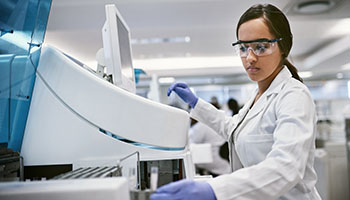
Join us in celebrating Women’s History Month with these individuals in STEM who were nominated by their Centers of Emphasis.
Between saying “yes” to opportunity and learning when to say “no” to protect one’s time and space, the individuals in our second Women’s History Month gallery share invaluable inspiration for the next generation of women working in science, technology, engineering, and math (STEM) fields. Nominated by leaders of their respective Centers of Emphasis at the Research Institute, these seven scientists work toward improving children’s health by driving discoveries in cancer research, health equity, developmental conditions, infectious disease, and much more.
Alongside those highlighted in the first part of this two-part feature, these women in STEM create a community that fosters a true sense of collaboration, career growth, and most of all, compassion. As said by one of these scientists, Rebecca Ahrens-Nicklas, MD, PhD, “Together, we navigate difficult situations, exchange exciting ideas, and celebrate our victories.”
Viviane Silva de Paula, PhD: “Persevere!”
Scientist, Center for Computational and Genomic Medicine
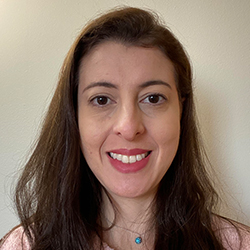
Viviane Silva de Paula, PhD
I am a biochemist-scientist whose research focuses on understanding the relationship between protein-ligand recognition in both the CRISPR-Cas9 genome editing technology and the pleiotropic interleukin-2 system. My research integrates structural biology tools from nuclear magnetic resonance spectroscopy with computational protein modeling and design, with the aim to develop therapeutic molecules with enhanced or altered signaling activities. I aim to advance in the research field, making possible the structure-guided design of more specific and less toxic protein-based therapeutics to treat autoimmune diseases and cancer.
My best advice to women aiming to pursue careers in STEM fields is to be persistent in pursuit of your goals. I am from Brazil, where the investments in scientific research are scarce, and there is a modest incentive for scientist training. Besides the adversities during my academic career, I never gave up. To be successful in a career in science, you must be confident in your knowledge and skills. You must persevere!
To this day, the thing I like best about my job, even though it is very challenging, is that it is still exciting for me. I love coming up with new ideas and testing them in the lab and finding fascinating results to share.
Juhi Pandey, PhD: “Learn the value of your time.”
Neuropsychologist and Scientist, Center for Autism Research
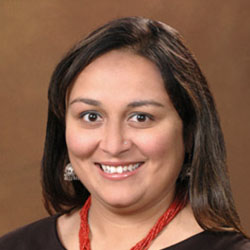
Juhi Pandey, PhD
I am a pediatric neuropsychologist and scientist whose research focuses on the early detection and diagnosis of autism spectrum disorder in at-risk populations, as well as the clinical characterization of autism and other conditions across the lifespan. My team and I work diligently to provide the most thorough characterization for a wide range of research projects designed to learn more about the biological and behavioral mechanisms of autism. As a clinician, I also have the privilege of working with clinical trainees at all levels during pivotal times in their growth and development.
The nature of autism and its heterogeneity makes for varied, unique, and complex profiles. I chose to pursue a clinical research career because it affords me the opportunity to help families learn more about their children to make change in their daily lives, while simultaneously collecting clinical phenotyping data that is aggregated with other variables within very large datasets to make important research contributions. I am therefore able to affect change at the individual level and beyond.
Being able to make differences at these various levels and to connect with so many amazing individuals and their families to improve their health and well-being makes me want to do better and be better as a clinician and researcher. And in doing so, I help train the next generation of autism experts.
My advice to young women interested in pursuing a STEM career would be to not shy away from taking space in a room or conversation. Mentors, supervisors, and colleagues need to hear often and repeatedly your views, perspectives, interests, and the opportunities that you see for yourself.
To really advance and make it in academia, learn early the value of your time and contributions. Rather than feeling the need to say “yes” to every suggested task or request, there is power in saying “no” to safeguard your time for activities that also benefit you, your career, and bring you joy. Finding that balance between tasks that we must do and tasks that we want to do helps to foster longevity and success!
Kathrin Bernt, MD: “Maintain your friendships, and maintain your space.”
Physician, Cancer Center and Investigator, Center for Childhood Cancer Research
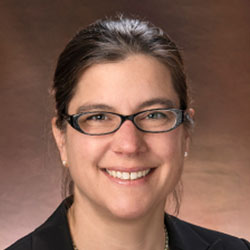
Kathrin Bernt, MD
My interest lies in investigating pediatric cancers as development gone awry. Many pediatric cancers have very few mutations, and they tend to be very different from adult cancers. One of the reasons why the powerful mutations seen in pediatric cancers can cause malignant transformation, sometimes as a single event, is because they tap into developmental programs that guide multiple aspects of cellular behavior all at once: the ability to survive, to grow, to migrate... Understanding normal development and how some of the master regulators are hijacked in cancer opens the theoretical — and in some cases practical — possibility to design more targeted therapeutic approaches.
My primary focus is in understanding how fusion proteins in leukemias can subvert some of these developmental processes to cause leukemia. We also find interesting parallels to solid malignancies and brain tumors in some of the pathways we investigate. This opens up a different — not tissue, but molecular pathway-based — view of pediatric cancers.
My advice to young scientists is to be bold and relentless. Don’t be afraid to fail, and if you do, don’t take it personally. Remember that if it were easy, it would have been done already.
On the flip side, one of the best pieces of advice I ever received from one of my mentors is to maintain something that is just yours: a passion that you follow just for yourself, as you are juggling the competing and ever-increasing demands of research, clinical care, teaching, mentoring, program development, family etc. Maintain your favorite sport or crazy hobby. Cook. Make music. Maintain your friendships, and maintain your space. It will feed back into all the other areas, making you kinder, wiser, and stronger for the journey ahead.
Katherine Yun, MD, MHS: “Don’t give up.”
Physician, Division of General Pediatrics and Faculty Member, PolicyLab
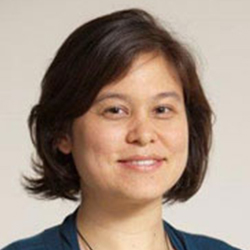
Katherine Yun, MD, MHS
I work on issues related to access, quality, and equity in care for immigrant families. I’ve always worked in this space. I think it has to do with my personal life experiences and my family history.
Don’t give up. If you love science, technology, engineering, or math, there are many great careers in STEM.
Katie Chiotos, MD, MSCE: “Accept new challenges.”
Physician, Critical Care Medicine and Faculty Member, Center for Pediatric Clinical Effectiveness
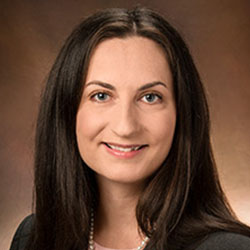
Katie Chiotos, MD, MSCE
My research focuses on antibiotic stewardship and the epidemiology of antibiotic resistant infections in the pediatric intensive care unit (PICU) setting. Using a variety of research methods, my work seeks to define the optimal antibiotic treatment regimens for infections commonly encountered in the PICU, as well as implement evidence-based practices surrounding antibiotic use, including stopping antibiotics when they aren’t necessary.
My interest in these topics stems from my clinical training in pediatric infectious diseases and pediatric critical care medicine here at CHOP, during which I came to appreciate both the unique challenges of diagnosing and managing infections in critically ill patients and the importance of judicious antibiotic use in this population to limit the emergence of antibiotic resistance. I am fortunate that my day-to-day clinical work, coupled with my role as medical director of the Antimicrobial Stewardship Program, continuously reinforces the importance of this topic and identifies new research questions.
Be persistent — success rarely comes easy in science and medicine, so expect mistakes, false starts, and failures along the way. Learn from these experiences. Accept new challenges, and don’t underestimate your ability to succeed, even if you feel unsure. Finally, be a good collaborator and a good colleague. Pull your weight, keep your word, and build up those around you — and surround yourself with people who do the same.
Amanda E. Bennett, MD, MPH: “Take chances, and say ‘yes.’”
Medical Director, Center for Autism Research
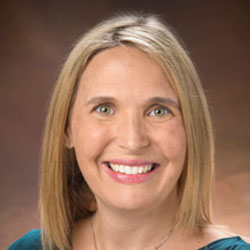
Amanda E. Bennett, MD, MPH
I am a developmental and behavioral pediatrician at CHOP and currently serve as medical director for the Center for Autism Research and clinical chair of the Autism Integrated Care Shared Governance Committee, overseeing the clinical autism programs across the Division of Developmental and Behavioral Pediatrics (DBP), Division of Neurology, Department of Child and Adolescent Psychiatry and Behavioral Sciences, and CAR. I also serve as the site lead for CHOP’s participation in the Autism Learning Health Network.
Clinically, I specialize in diagnosing and managing co-occurring symptoms in people with autism spectrum disorder (ASD) and Fragile X Syndrome. Much of my research aligns with those clinical interests and spans leading clinical trials of pharmacologic and psychosocial interventions for children with ASD and Fragile X, investigating screening and identification practices for ASD and co-occurring conditions, and improving care for people with autism in the community.
While I joke that I’ve stumbled and tripped my way through my entire career, I always have been drawn to working with people with disabilities and found DBP to be the perfect home early in my medical training. I love knowing that I’m working for people who cannot always advocate for themselves, and I love seeing how science and research has changed systems to improve care for people with autism over the years.
My biggest advice to women pursuing STEM is to take chances and say “yes” to opportunities, even when you may doubt your qualifications or experience. It’s so easy to talk oneself out of pursuing something new, particularly for so many women who suffer from imposter syndrome. However, every great opportunity that has helped to define my current role felt like a big stretch in the beginning. It was only by saying “yes” that I was able to grow in my career. Over time, I also began to learn how to say “no,” when a request was not a good fit with my current work or interests, but I’ve used those opportunities to try to connect others and foster collaboration.
Rebecca Ahrens-Nicklas, MD, PhD: “Develop a community.”
Physician, Division of Human Genetics and Investigator, Raymond G. Perelman Center for Cellular and Molecular Therapeutics
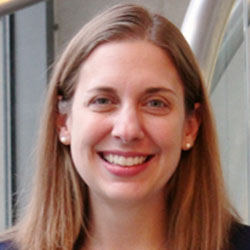
Rebecca Ahrens-Nicklas, MD, PhD
My research focuses on inherited disorders of biochemical pathways, known as inborn errors of metabolism. While each individual diagnosis is rare, collectively one in 1,500 infants is born with one of these biochemical disorders. More than two-thirds of patients suffer from progressive neurologic symptoms, such as developmental delay, seizures, and neurocognitive regression. Unfortunately, most available therapies do not improve neurologic or developmental outcomes.
In my lab, we work to understand the pathophysiology of neurometabolic disorders, in order to develop better therapies. Clinically, I am a rare disease pediatrician who cares for children with inherited biochemical disorders. I often meet my patients when they are infants and have the privilege of caring for them throughout their lives. I watch as families struggle with the neurologic complications of these diseases. My patients are the major motivation for our research efforts. Ultimately, I hope our work can improve outcomes for my rare disease patients, while also providing insights into fundamental biologic phenomena.
My biggest piece of advice to young women interested in a STEM career is to find something you are passionate about and throw yourself into it. There will absolutely be obstacles and setbacks that arise, but if you are investigating something you love, this will help get you through the tough times. Also, develop a community of friends and colleagues who support your goals and passions. I think it is especially important to develop a peer network of female STEM colleagues. I have been so fortunate to find an amazing group of female physicians and scientists here at CHOP. Together, we navigate difficult situations, exchange exciting ideas, and celebrate our victories.